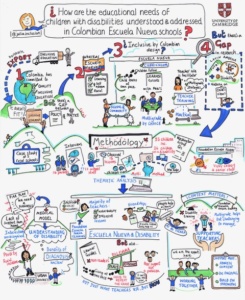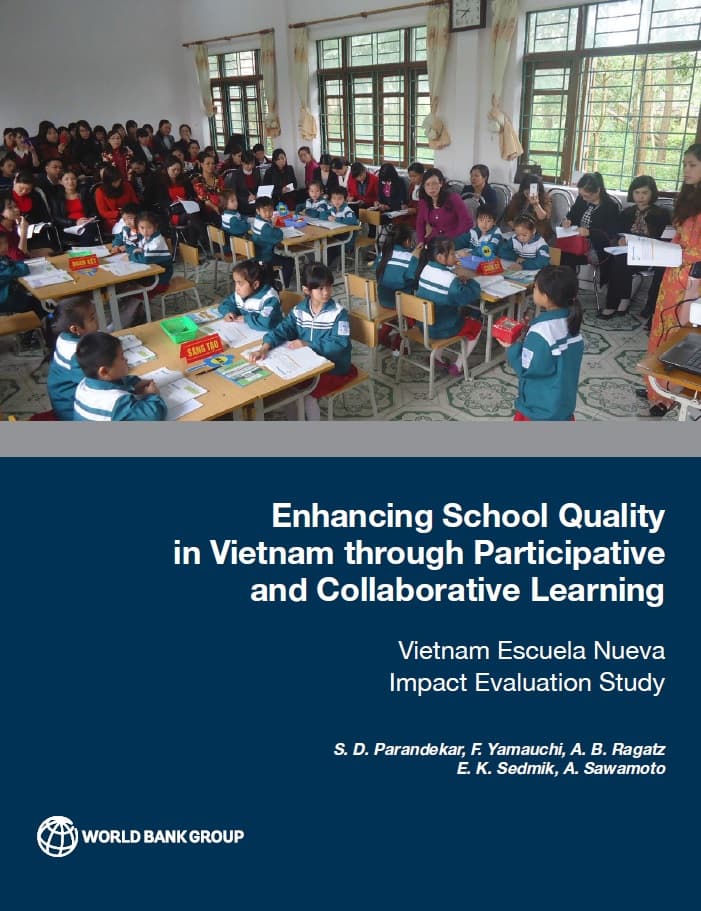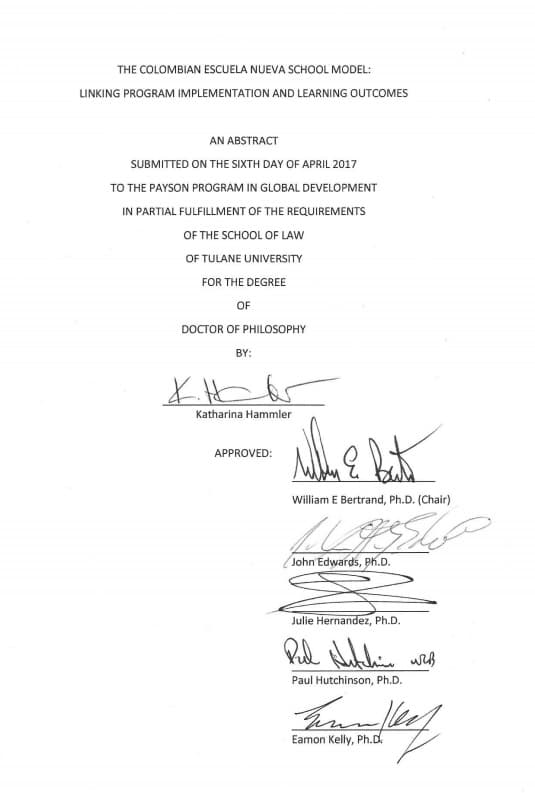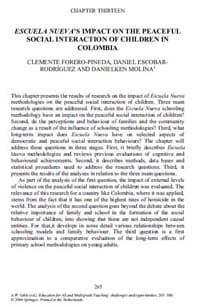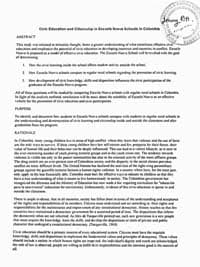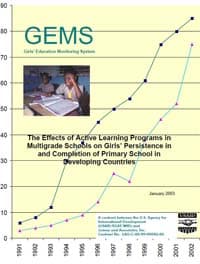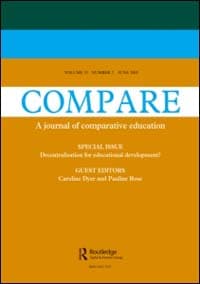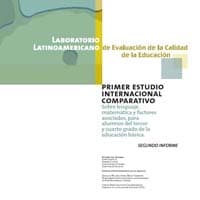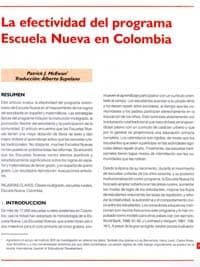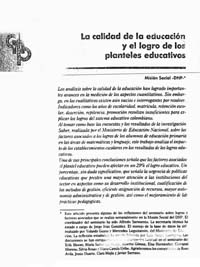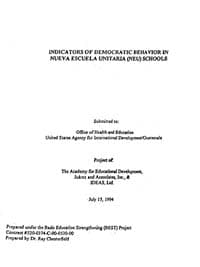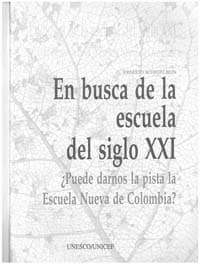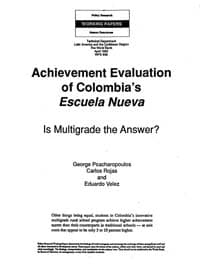Several evaluations and studies carried out by national and international organizations, from the late seventies until today, have consistently confirmed that students who learn with ENA obtain better academic performance than students in conventional schools.
Likewise, they have also been evaluated and shown better results in improving self-esteem and in the formation of democratic behavior and peaceful coexistence. There is also evidence of how the innovative and transformational ENA methodology achieves a strong impact on promoting gender equity and the empowerment of girls.
The following are some of the most outstanding research and evaluations:
Julia Hayes Ph. D. of Philosophy from University of Cambridge. 2021
In her doctoral thesis, Julia Hayes conducted a research aimed to explore how the school staff, parents and children of five rural Escuela Nueva schools in Colombia, understood and addressed the educational needs of children with disabilities. Adopting a qualitative case study approach, the author conducted 46 interviews and 15 non-participant classroom observations across the five rural schools of Las Colinas, over a period of eight months. This included interviews with 11 school staff, 14 parents and five senior staff from Fundacion Escuela Nueva. To seek the views of children, Hayes used a multi-method visual participatory approach with 53 children aged between 7 and 11 years, of whom, 26 were children with disabilities.
Enhancing School Quality in Vietnam through Participative and Collaborative Learning.
Vietnam Escuela Nueva Impact Evaluation Study , S. D. Parandekar, F. Yamauchi, A. B. Ragatz, E. K. Sedmik, A. Sawamoto World Bank Group. 2017
The Escuela Nueva Activa program in Vietnam (VNEN), initiated in 2010 by the Government of Vietnam with technical assistance from FEN. Seeks to stimulate a transformative and powerful learning experience that encourages children´s abilities and the necessary skills for the 21st century. This report presents the results and conclusions of an Impact Assessment study of the VNEN program, made by the World Bank. The study compares the experience of students and school communities that implement VNEN, with the experience of a randomized group of traditional schools. The comparison cohorts of children from third through fifth grade shows that the VNEN program positively impacts students´ cognitive and non-cognitive skills.
The Colombian Escuela Nueva School Modeling: Linking program implementation and learning outcomes
Katharina Hammler Ph. D. from Tulane University in the United States. 2017
In her doctoral thesis, Katharina Hammler demonstrated -through mixed methods- how the Escuela Nueva model improves learning outcomes, analyzing census data at the national level in Colombia and also making a multi-level analysis in Quindio. Hammler concluded that the results showed that students who were in schools officially classified as Escuela Nueva did better in SABER Test with differences between 10,5 and 23,2 points than those who were in conventional schools. This effect was comparable to that of the difference of a socio-economic level. She also concluded that Escuela Nueva tends to reduce the gap between socio-economic levels and gender.
Escuela Nueva´s Impact on the Peaceful Social Interaction of Children in Colombia
Clemente Forero. 2006
This chapter presents the results of research on the impact of the Escuela Nueva methodologies on peaceful social interaction by children. Three main research questions are addressed. First, does the Escuela Nueva methodology have an impact on the peaceful social interaction of children? Second, does the perception and behavior of families and the community change as a result of the influence of these study methodologies? And third, what long-term impact has Escuela Nueva on the aspects of democratic interaction and behavior of peaceful social interaction?
Civic Education and Citizenship in Escuela Nueva schools in Colombia
Jennifer Pitt. 2003
This study was initiated to stimulate thinking, foster a great understanding of what constitutes an effective civic education, and emphasize the potential of civic education in developing countries and countries in conflict. Escuela Nueva is presented as a civic model of effective education. Schools that implemented the Escuela Nueva model were studied to determine: 1. How civic learning within the school affects the external activities of the student; 2. How Escuela Nueva schools can be compared with traditional rural schools, regarding the promotion of civic education; 3. How the development of civic knowledge and skills influence the provision of civic participation in the Escuela Nueva graduates.
USAID, 2003.
This document presents a summary of the results of the study about the effects of female participation in multigrade schools with innovative learning programs. The creators of education policies are increasingly changing to multigrade school strategies that are involved in community participation and active learning methodologies in rural communities, with the hope of improving the quality and access to primary school.
Active Learning and Democratic Behavior in Guatemalan Rural Primary Schools.
Chesterfield et al., 2002
Emerging democracies, like Guatemala, are beginning to experiment with active learning methodologies to improve teaching and promote democratic behavior among children. However, there is little information on the effects of different classroom environments on the behavior of children in developing countries. This study uses an approach to observations of a classroom to examine differences in democratic behavior among children of different genders and ethnic groups, taking into account those who attend traditional rural schools and those attending rural schools with an experimental active learning program.
Primer Estudio Internacional Comparativo sobre lenguaje, matemática y factores asociados, para alumnos del tercer y cuarto grado de la educación básica (First International Comparative Study on language, mathematics, and associated factors for students in third and fourth grades of basic education).
LLECE – UNESCO. 2000
This document contains the core aspects of the Technical Report of the First International Comparative Study prepared by LLECE. It deepens and interprets the results from the analysis of the levels of performance in Language and Mathematics and the findings of the different factors that explain them. The second report focuses on the discussion of the implications and recommendations on Educational Policies.
La Efectividad de las Escuelas Multigrado en Colombia (Effectiveness of Multigrade Schools in Colombia).
Stanford University. Patrick J. McEwan. 1998
This article demonstrates the effectiveness of the Escuela Nueva model in improving student achievement in Spanish and Mathematics. Typical program strategies include multigrade instruction, flexible student promotion, and active community participation. The article finds that Escuela Nueva schools have a better provision of textbooks and give greater emphasis on active learning than conventional rural schools. However, many Escuela Nueva schools have not implemented all the reforms. It was found that Escuela Nueva schools have positive and statistically significant effects on Spanish and Mathematics achievement in third grade, and in Spanish in fifth grade.
La calidad de la educación y el logro de los planteles educativos (The Quality of Education and the Achievement of Schools).
Social Mission of the National Planning Department of Colombia. 1997
Analyzes of the quality of education have made significant progress in measuring quantitative aspects. However, there are still gaps and questions unanswered. Indicators such as years of schooling, enrollment, student retention, dropout, repetition, promotion, are insufficient to explain the achievements of the Colombian educational system. Based on the surveys and results of Saber Test, conducted by the Ministry of National Education, on the factors associated with the achievements of primary school students in the areas of Mathematics and Language, this paper analyzes the impact of school establishments in the results of educational achievements.
This article presents some of the reflections of the seminar on achievements and associated factors that takes place weekly in the DNP Social Mission.
Indicators of Democratic Behavior in Nueva Escuela Unitaria in Guatemala
USAID, Juárez and Associates. 1994
This paper presents a study of democratic behavior with children participating in the BEST project. The study is limited to the Escuela Nueva Unitaria (adaptation of the Escuela Nueva model in Guatemala) pilot project, as a single project activity that identifies and specifies democratic behavior and skills as curriculum objectives. The study used observational data -since the 1993 school year- as part of the Educational Quality Improvement project. These data were analyzed for this study by Dr. Ray Chesterfield.
En Busca de la Escuela del Siglo XXI (Looking for the School of the XXI Century).
Ernesto Schiefelbein. UNESCO/UNICEF.1993
The first part of this study describes the situation of primary education in Latin America, to conclude that these countries should look for solutions to improve the quality of their education since conventional school faces many difficulties to increase current levels of quality.
The second part analyzes the underlying fundamentals of the Escuela Nueva model, describes the development of the model and its evaluation, and indicates educational elements used by this model.
The third part presents the main aspects of the Escuela Nueva model that planners can implement in other countries, the necessary conditions for its adaptation, and concludes with some approaches of national strategies that can be developed in conjunction with the implementation of the model.
World Bank. 1992
Under the same conditions, the school performance of the students of the innovative Escuela Nueva model developed in Colombia, is considerably higher than that of conventional school students, at a unit cost of only 5 to 10 percent higher. This document, a product of the Human Resources Division of the Technical Department for Latin America and the Caribbean for Policy Research, is part of a great effort to assess the quality of primary education in the region.

